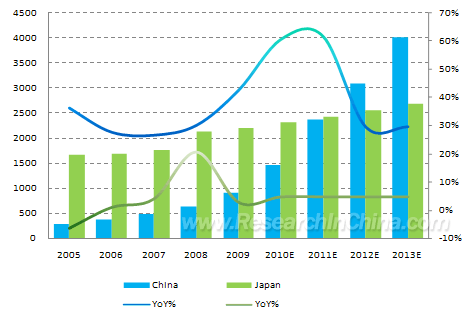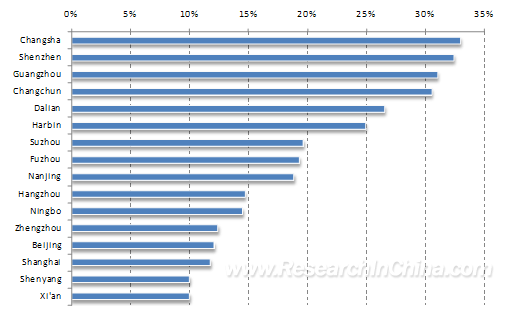China is on a cinema-building binge
The growth in movie theaters is frenetic, with plenty of room for expansion, but it's not clear how much that might help Hollywood.
March 06, 2011|By David Pierson, Los Angeles Times
Reporting from Shengzhou, China-- —
LIGHTS, CAMERA, CHINA!
This is the first in a series of occasional reports on China's fast-growing film industry and the opportunities -- and challenges -- it presents for Hollywood.
Not long ago when Zhang Guomiao wanted to see a film, he'd head for the village square. There, itinerant cinema operators would unfurl a canvas screen, set up some static-filled speakers and show a grainy movie in the open air.
"We had to bring our own stools if we wanted to sit," said Zhang, 47, who remembered chickens clucking by his feet and neighbors talking loudly. "You couldn't hear much of the movie."
The cinema-building binge is powered in part by ideology. The Communist government is a major investor in film production, distribution and movie houses. Film is a way to strengthen state influence at home and export Chinese culture abroad.
Movies are "part of a country's soft power," said Han Sanping, the head of state-owned China Film Group.
Still, the main drivers are practical. Unlike in the U.S., where DVD sales can account for as much as 40% of a film's revenue, rampant piracy has forced studios here to depend almost exclusively on domestic box-office receipts. Bankrolling more pictures and boosting profits requires more screens.
Then there's boredom. As Chinese workers grow richer and have more leisure time, they're itching for something to do. The typical ticket costs about $5, slightly less than what many new college graduates earn per day. Still, Chinese movie fans have shown a willingness to pay a premium for better sound, a better picture and swanky venues to hang out with friends.
"There really wasn't much to do here" before the multiplex opened in Shengzhou, said Wang Jinjin, a 24-year-old employee at a local pharmaceutical company. Wang, who earns about $400 a month, said he's visited the theater three times within a few weeks, treating his girlfriend to a ticket, popcorn and bottled water each time. He particularly liked the special effects in Sony Pictures' horror sequel "Resident Evil: Afterlife."
Hollywood movies consistently draw big crowds here and capture upward of 40% of annual ticket sales. Warner Bros.' "Avatar" is the top-grossing film of all time in China, topping $200 million at the box office.
But just how much Hollywood will benefit from China's ambitious cinema expansion remains to be seen.
The Motion Picture Assn. of America has complained for years about strict government limits on the number of foreign films that can be shown in Chinese theaters, which in turn encourages piracy. Warner Bros., a pioneer in cineplex building in China, pulled out in 2006 when Beijing banned majority ownership of cinemas by foreign firms.
The U.S. scored a victory when the World Trade Organization ruled that China must end the government's monopoly on the distribution of imported books, movies and films by March 19. But that ruling said nothing about the film import quota, which remains intact for now.
In the meantime, Chinese movie studios are ramping up cinema construction and trying to boost the quality of homegrown films to keep patrons filling all those new seats. That's a tall order for an industry that churns out a lot more flops than blockbusters. Still, three Chinese productions — "Let the Bullets Fly," a gunslinging action comedy; "Aftershock," about the devastating 1976 Tangshan earthquake; and "If You Are the One 2," a romantic comedy sequel — were smash hits at the box office last year.
And despite Warner Bros.' quick exit from China, some foreign exhibitors see opportunity there. Imax Corp. of Canada plans to triple its presence in China to 300 theaters by 2016. South Korean-owned Lotte plans to have 70 screens in China by the end of the year.
Though about half the theaters in China have some degree of government ownership, the largest cinema developer is privately held Wanda Group, which has doubled its screens to 600 since 2008. With competition growing in China's biggest cities, exhibitors are looking to seize untapped markets in the country's backwaters.
In Shengzhou, a former agricultural center turned manufacturing hub, local authorities determined that the city was ripe for a modern multiplex. Aside from evening strolls, karaoke and card games, there wasn't much for workers to do in the city known as China's necktie capital.
So in 2009, Zhejiang Film Co., which is owned by the provincial government, turned to Pan Xiaming, one of its young managers, to secure a location and oversee construction. The son of tea and sugar-cane farmers, Pan, 28, started at China's fifth-largest cinema chain as a projectionist. The Shengzhou native is so passionate about film that he once traveled 80 miles to the tourist city of Hangzhou to watch "Avatar" in 3-D.
"The whole time I was in the theater, I kept imagining how great it would be to have this in my hometown," Pan said.
Situated in a busy shopping mall, near the city's most expensive town houses, Pan's cineplex — Shengzhou Time Movie World — was an instant success. Pictures including Disney-Pixar's "Toy Story 3" and "Aftershock" played to sold-out crowds on weekends after it opened in the summer.
"It's much better than watching movies off the Internet," said Wang Jiayi, a sporting-goods store clerk who has visited the cinema six times. "You can't feel it off a computer screen."
These days he visits a new seven-screen multiplex outfitted with plush seating, 3-D screens and popcorn imported from the U.S. The rice farmer went with friends to see the best-picture Academy Award nominee "Inception," marveling at the science-fiction thriller's special effects, throbbing soundtrack — and the clean cinema floors.
FOR THE RECORD:
Chinese cinemas: A March 6 article about China's fast-growing cinema industry said the movie "Avatar" was a Warner Bros. film. The movie was released by 20th Century Fox.
"The movie was very hard to understand, but the cinema was very comfortable," Zhang said. "As a farmer, I thought it was very luxurious."
Across China, millions of people like Zhang are experiencing modern cinemas for the first time. State-of-the-art theaters are replacing dilapidated movie houses not only in wealthy urban centers like Beijing and Shanghai but in outposts like Shengzhou in central Zhejiang province, which has grown into a bustling city of about 800,000.
Over the last four years, the number of screens in China has doubled to more than 6,200, a figure that's projected to double again by 2015. Box-office receipts hit a record $1.5 billion last year, according to the State Administration of Radio, Film and Television.
That's still well behind North America, where there are more than 40,000 screens and box-office revenue was $10.6 billion in 2010.Still, China is already considered the world's No. 4 movie market, behind only North America, the European Union and Japan. And with only one screen for every 220,000 Chinese residents, exhibitors have plenty of room to grow.
"China's cinema industry is practically going from two tin cans and string to an iPhone 4 in one fell swoop," said Rance Pow, president of Artisan Gateway, an entertainment consulting firm.
Pan met one family who watched three different movies in a single day. He even persuaded his parents to come. It was the first time they had ever seen a film in a cinema. They wept through a screening of "Aftershock."
"Many people were having their first experience in a cinema," said Pan, whose sober black suits can't disguise his boyish features. "A lot of our customers were in their 50s or older and haven't seen a movie on a big screen in 10 or 20 years. They realized things have changed a lot."
At first glance, Shengzhou Time Movie World could pass for any cineplex in a U.S. suburb. The familiar aroma of buttery popcorn wafts through a carpeted lobby. Movie times are displayed on a large digital screen above ticket clerks in Pepto-Bismol-colored uniforms. Theater seats feature cup holders for jumbo-sized servings of soda.
But alongside the Dove chocolate, Lay's potato chips and Haagen-Dazs ice-cream bars at the concession counter are packs of dried prunes, squid and smelt. Ushers have to remind some patrons to stub out their cigarettes in the smoke-free facility.
At an early-evening screening of "Harry Potter and the Deathly Hallows," the differences between the Chinese and American moviegoing experiences were clear.
Viewers talked through the entire film, reading subtitles and gleefully sounding out the English dialogue whenever they could.
"Ah, I get it now, they all have magic," said one woman to her companion in an excited voice, some oversharing that carried to the other 50 patrons.
Cellphones rang incessantly. One woman answered her iPhone six times. Someone in the back hocked spit. Not once did anyone complain.
"After all," Pan said, "it's still a village."




 Reply With Quote
Reply With Quote



